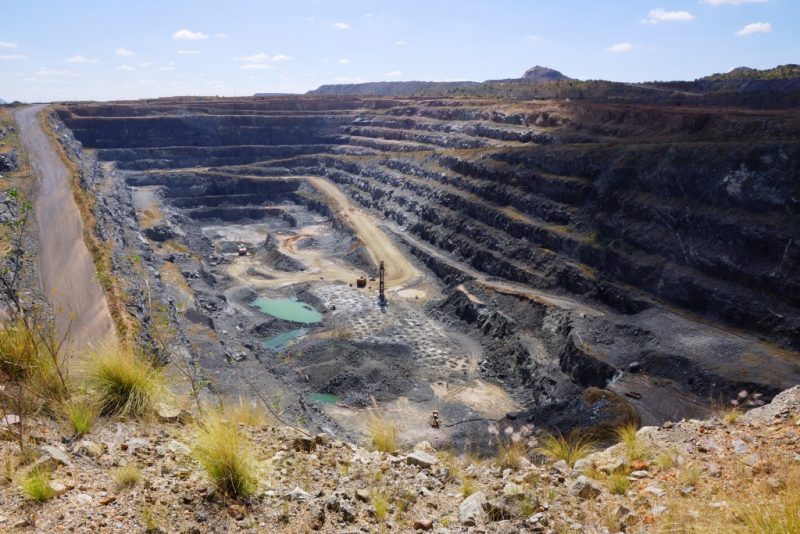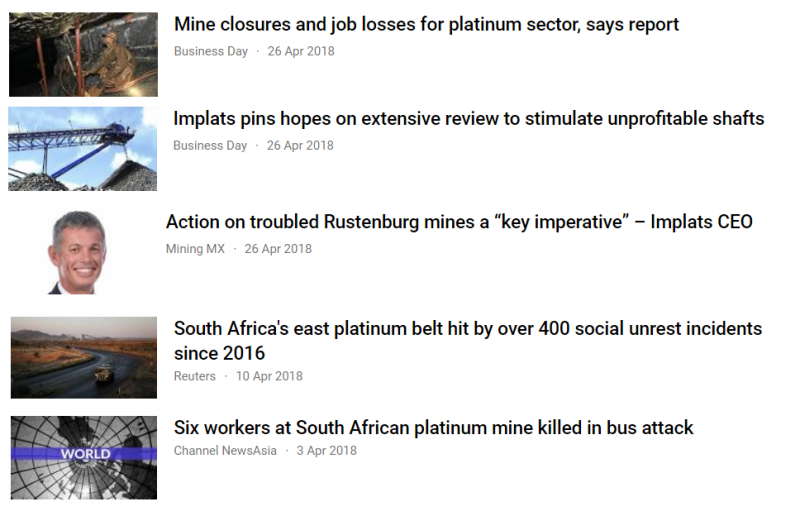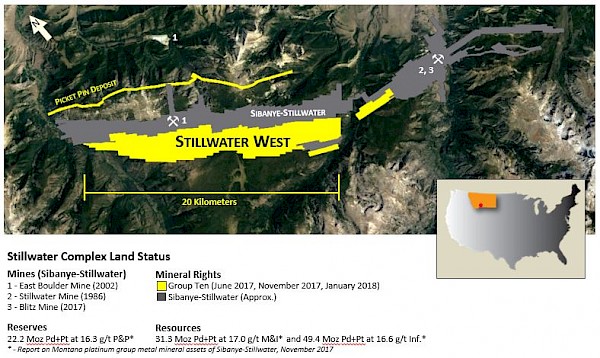
Recent activity in exploration and acquisitions in North America for the next supply of platinum reveals a troubling situation for South African platinum mining, which presents opportunities for platinum companies in safer jurisdictions.
If you conduct a brief survey of headlines about platinum mining in South Africa, a stark picture is revealed.

JP Morgan Cazenove recently reviewed the SA platinum sector. South Africa accounts for 70 per cent of global mine supply and, at current prices, JP Morgan estimated about 60 per cent (2.6 million ounces) of South African mines are cash negative. The report commented “the outlook for the platinum price in 2018 to 19 is bleak.”
Part of this problem is that South Africa’s platinum miners resemble a “dysfunctional oligopoly” and are currently increasing supply despite depressed platinum prices with no significant improvement in the situation expected until 2020.
The report from JP Morgan Cazenove showed just how dire the situation is for SA miners and predicted that the year of change would be in 2020 as efforts to keep unprofitable mines going at enormous expense failed.
South African Mineral Resources Minister Gwede Mantashe said at a platinum conference there was no crisis in the sector. This comment nearly choked Northam Platinum CEO Paul Dunne with a breakfast sausage when hearing this willfully ignorant assessment at the conference.
The eastern limb of South Africa’s platinum belt has been hit by over 400 incidents of social unrest impacting mining operations since the start of 2016, according to data compiled by Anglo American Platinum and provided to Reuters.
The data does not provide estimates on production or revenue losses and does not compare with earlier periods. But it provides an alarming snapshot of a region in a perpetual state of unrest that has undermined the viability of some operations.
In response to this deteriorated operating environment, South African miners have been looking abroad and one acquisition has renewed Platinum exploration interest in North America.
South African miner, Sibanye Gold Ltd. announced the $2.2-billion takeover of Stillwater back in 2017. The company has since changed its name to Sibanye-Stillwater to reflect this change of focus for the company.
One Canadian firm has agreed to buy 282 mining claims just west of the Stillwater Mining complex with the hope of expanding mining. Stillwater West PGE-Ni-Cu project, consists of 44-square kilometres adjacent to, and contiguous with, Sibanye-Stillwater’s high-grade Platinum PGE mining operations, in Montana, USA.
Group Ten’s (TSX-V: PGE) acquisition of the highly-prospective Stillwater West project positions the company as the second-largest landholder in the Stillwater ultramafic complex.

The company’s claims cover two groups in Custer National Forest on the East Boulder plateau in the Beartooth Mountain Range. It’s along the Johns-Manville, or J-M reef, which boasts some of the world’s richest deposits of platinum and palladium.
The high-grade J-M Reef deposit and other PGE-enriched Reef-type sulphide horizons in the Stillwater complex share many similarities with the highly prolific Merensky and UG2 Reefs in the Bushveld complex, while the lower part of the Stillwater complex shows the potential for much-larger-scale disseminated and high-sulphide PGE-nickel-copper-type deposits, such as the Platreef, Waterberg and Mogalakwena mines, that occur in the northern limb of the lower Bushveld complex.
Before any major new development occurs, Group Ten Metals must do additional geological work to determine the true extent and nature of the PGE mineralization as their ground is not directly analogous with the ultra high-grade reef style deposit of their neighbor, President and CEO Michael Rowley state in a telephone interview.
“There’s no question there is polymetallic mineralization there. It’s a question of how much, and, is it minable? It is a great time to answer these questions as it appears the market is in the process of a turnaround. Money has begun to come back in to the sector, and commodities are starting to get a lot of attention again.”
The company recently identified 12 major geophysical conductive anomalies from a 1,914 line kilometer magnetic survey of the property Michael Rowley stated:
“We are extremely encouraged by the size, strength and number of conductive targets identified at Stillwater West…our new insights into the geology of the Ultramafic and Basal Series of the complex. We see potential for multiple deposit types and indications of a much larger mineralized system than has been previously recognized in this under-explored part of the Stillwater Complex. We are especially excited about the similarities in the setting and style of mineralization at the Stillwater West Project to those seen in the world-class Platreef deposits of the lower Bushveld Complex.”
Rowley founded Group Ten in 2006. He said the company struggled to hold on during the commodity collapse but emerged in a good position on the other end.
Along with bringing on technical expertise with former employees of Sibanye-Stillwater, the company has acquired an extensive database on the property, including a significant drilling assays and core library which could yield important new information. This gives the company an in depth understanding of the property.
If conditions deteriorate as predicted by JP Morgan’s platinum report, Platinum miners are going to need to find news sources to mine. Group Ten Metals Stillwater property presents potential new source for platinum and palladium as well as a suite of other in demand metals..





 Follow us on Twitter
Follow us on Twitter Become our facebook fan
Become our facebook fan










Comments are closed.